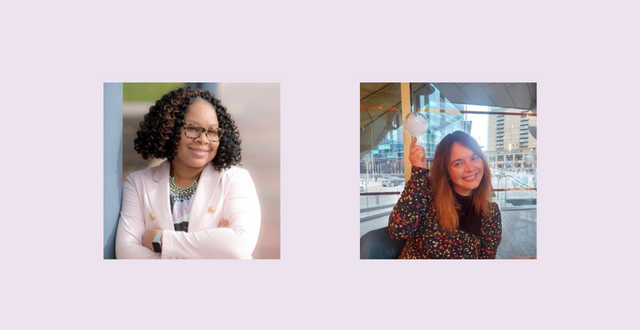
As a powerful advocate for DE&I over many years, Nija Davis-Pringle joined Qurate Retail GroupSM in 2021 to lead the Global DE&I Attraction, Partnerships and University Relations space. In her previous roles, she was responsible for creating a DE&I-focused MBA Leadership Development Program and the first diversity strategy for recruiting in the conference and university space.
Her UK colleague, Kylie Thompson, is equally passionate about moving the needle in her role as Senior Partner of Diversity and University Programmes at QVC ® International, part of Qurate Retail Group, having worked across the globe shaping diversity strategy and implementing inclusion programmes. We talked to them about diversifying the talent pipeline, how their own intersectionality experiences have influenced their work and why evolving the recruitment process to greater inclusivity is so vital for business success.
How has your own intersectionality informed the way that you look at diversity and recruitment?
KYLIE — I am passionate about disability inclusion in DE&I recruitment as I am neurodiverse, and I’ve experienced being excluded at certain points in my life. So, my career has been inspired by wanting to help others to avoid that horrible feeling in any way I can, but also just trying to ensure fairness and a positive experience for everyone, especially in the recruitment process. I’ve worked for some great companies and on programmes that have made real positive change, but one of my biggest career highlights was when QVC UK was accredited as a Disability Confident employer, because that recognition brought all our efforts together. It also really means a lot personally to know we have reached that standard and that we are making sure we’re being inclusive and fully supporting all candidates as they go through the recruitment process with us.
NIJA — Being a Black woman in the corporate world, I’ve always been told to “be more” – more experienced and more educated to get ahead or be seen. I’ve had first-hand experiences where I’m attending a meeting and I’m deliberately not included in the conversation, spoken over or just ignored completely. So, my passion around DE&I in recruitment was initially sparked from my own experiences, but then as my children started to attend college, I wanted to make sure they were equipped with the same “survival” tools I gained from my experiences. I also noticed the lack of help for Black and brown students at the Career Services Centre at college. That landed me in the DE&I Talent Acquisition space with a passion for University Relations and Early Career talent. I purposefully connect and reach out to students from Historically Black Colleges and Universities (HBCU) and Hispanic-Serving Institutions (HSIs) via events and LinkedIn and start the conversation around their career goals, etc. This allows me to help with their career journey from the beginning and support them as much as they need throughout their journey. Qurate Retail Group has allowed me to lead the charge in the DE&I Partnerships and University Relations space, and by connecting this work to our global DE&I goals, this helps expand the work beyond early talent!
If you want an inclusive workspace, is it incumbent on you to put yourself forward to make active change?
NIJA — I always start my commentaries with my personal experience, but I try to tell my truth and not ‘represent’ all Black women, because everyone has a different story. Inclusive behaviours are for everyone to demonstrate, not just a particular group or individual. Everyone must be involved in the work and get behind DE&I initiatives – that’s when real change will happen.
KYLIE – Yes, exactly. Whenever I’m speaking or training, I start with a version of, “I’m here today to talk to you about this subject, but this is not going to change if you leave it up to me. I can’t do this on my own.” Everyone needs to work together towards the same goal.
What is the biggest thing you’ve learned about DE&I in the work you’ve done?
KYLIE — The diversity landscape is always changing and shifting. But in the end, it’s not just about gender, ethnicity or age — you need to think about DE&I as the sum of many parts – with the intersectionality of diversity representing identities which are not always obvious, such as sexual orientation, hidden disabilities and neurodiversity. People tend to shy away from diversity topics or initiatives because they fear they don’t know much about the subject and therefore can’t get involved. I always say ”try and get comfortable with being uncomfortable” because if we could all do that in the diversity space, it would make things a lot easier. People don’t want to do or say the wrong thing, so often times they just don’t say or do anything at all. We need to address this to create real and positive change.
NIJA — I totally agree with Kylie here! Adding on a point around “allyship” – people want to learn how to advocate for each other and want to know what a good advocate looks like. They might be the quiet ones in the background of the room you’re in, but they’re the ones who speak up when you’re not in the room. I know I have people on my side who are not just cheering me on when I’m there but are actively helping to bring diversity and inclusion issues to the forefront every day.
How do we make the recruitment process more inclusive?
NIJA — QVC has set some fantastic goals around diversity within the next two to three years, and part of that has involved mandating a Diverse Candidate Slate, where we hold our leaders, hiring managers and recruiters accountable for finding diverse talent and including that talent in the interview pool. Alongside that, you need to look in specific places to get diverse talent and be proactive about advertising on different platforms. For example, invest in DE&I Partnerships and University connections.
KYLIE – What stands out for me is the way we’re making sure to use inclusive language and criteria in job adverts and descriptions. It’s also important to assess inclusive behaviours in the interview process — and build questions around different candidate needs in interview guides. For example, asking candidates to share when they’ve advocated or been an ally for somebody who doesn’t have a voice at the table. By assessing for inclusive behaviour in the interview process it also means companies are bringing in people who really care about building and working in an inclusive team at all levels — that’s how you really make cultural change.
What would you like to see happen in five years’ time in DE&I and recruitment?
NIJA – I would love to see DE&I just become second nature whereby we aren’t having to run reports to see who is and isn’t doing it because we’re all just proactively looking for diverse candidates. I’d also like to see more diversity in executive leadership roles because that’s what diverse talent is looking for when considering where they want to work.
KYLIE – I’d love to see more open recruitment programmes, not just focused on graduates, but anyone who wants to change careers, retrain, is returning from a career break or can’t afford to go to college or university. A lot of the time, people try to hire exact copies of a strong performer or even themselves. If we could move away from that to hiring and investing in people who bring something different to the table that would be amazing. I would also like to see more focus on hiring for potential (not just experience) and hiring for diversity inclusion.



